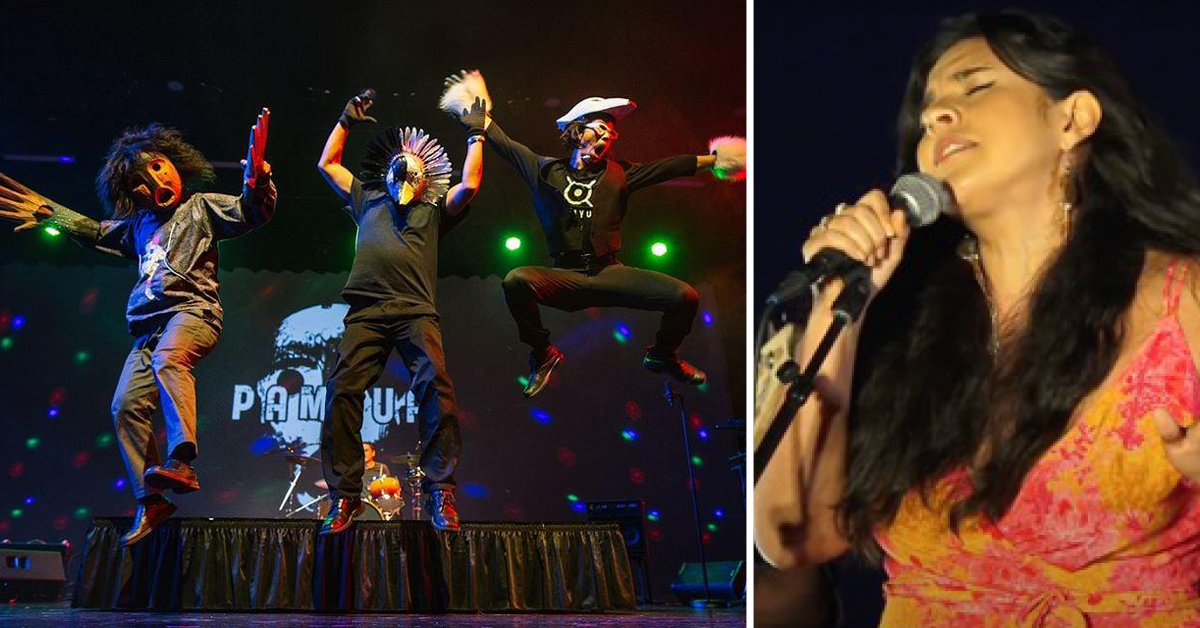
Pamyua and Kelly Caballero
In celebration of Native American Heritage Month, today we’re highlighting the work of two compelling Native artists who have performed on Levitt stages either in person or virtually. There are myriad ways to be Native and express Native culture, each with intricate cultural traditions and modern interpretations, and these artists — Pamyua and Kelly Caballero — both draw on their heritage in their songwriting and musical expressions to showcase these complexities.
Pamyua — Inuit music for the soul
“Pamyua” (pronounced bum-yo-ah) is an Inuit, specifically Yup’ik, word which means “tail end of (something)” and is traditionally used to say “Encore! Do it again!” Pamyua calls their music “Inuit soul,” because they play with traditional melodies from the Inuit cultures of Alaska and Greenland mixed with contemporary vocalization and instrumentation. The result is a joyful and sincere representation of the enduring Inuit heritage that the group believes can help bring unity between different cultures.

Pamyua performing at Levitt AMP Soldotna in 2021
The marks of Indigenous culture in Pamuya’s music are plentiful — inspired by their Inuit community, they incorporate traditional Yup’ik dance and face masks, and have also used “seal call” vocalizations to express their relationship to animals and the natural world, creating what Native People’s Magazine described as “a blizzard of interlocking harmonies.”
The group was formed in 1995 by brothers Philip Kilirnquc Blanchett and Stephen Qacungatarli Blanchett from Anchorage, Alaska. The Blanchett brothers grew up going to a Black church in Anchorage, and describes this community as their “second village” in addition to their Inuit community. From the beginning, they have incorporated both their African American and Inuit heritages into their music: “When we started Pamyua it was really clear; we’re Black. We’re Yup’ik. This is what we do,” Philip Kilirnquc Blanchett said. In addition to the Blanchett brothers, the group is complete with Ossie (Aassanaaq) Kairaiuak of Chefornak, Alaska and Karina Moeller of Greenland, and they also play with additional musicians from around the world.

Pamyua and additional collaborators (pamyua.com)
Pamyua performed at the 2019 and 2021 Levitt AMP Soldotna Music Series, with each show featuring a number of Native artists as part of a larger effort to amplify Native stories in Soldotna to make reparations for past violence against Native communities and increase representation of Native Alaskans. “We’re a testament that there’s still room for change in the culture, the awareness of people,” Blanchett said in an interview with Indie Alaska.
Kelly Caballero — reclaiming Tovaangar through music and poetry
Kelly Caballero is a Tongva, Yaqui and Xicana singer and songwriter, performer, poet, and jeweler who uses her art to educate about the history of Tongva people on the land that is now known as Los Angeles, but historically was part of the tribal territory Tovaangar (originally meaning “the world”). Caballero’s work largely focuses on the lived experiences of Indigenous people living in urban settings: “Being in the city and being a Native American is a whole different ball game,” Caballero said, “it feels like the grass that pokes up through the cement, it’s finding the beauty in the rubble.”

Kelly Caballero performing at Levitt Los Angeles’ Barrio Fino
Caballero performed virtually at Levitt Los Angeles’ Barrio Fino, Episode 1: “Natives in the Now.” Performing on her ancestral land, she gave an emotional performance in which she dedicated her song “Mountains” to people who’ve been struggling during the pandemic, and “Anywhere” to Angelenos who have to “drive over two hours just to be in some kind of nature, to be alone with the trees, to find some clean running water.”
https://youtu.be/KF2fFLCAdOE
Caballero’s songwriting often emphasizes her and her people’s strong connection to nature and their physical land. Her first song, “Siren,” is about a girl calling people to her like a siren to make them hear and see her as a Tongva woman, and in her poem “California,” she says “maybe if I could speak my mother tongue the rivers would rise to meet me.”
Activism is also a strong focus in Caballero’s work, and part of what inspired her to become an artist was the protests against the Dakota Access Pipeline. “Standing Rock was definitely the catalyst for me to be more open and proud of my culture and heritage,” Caballero said. The protests inspired her to “do good work in my community and bring awareness to the original people of Los Angeles.” Caballero also performed at the Yo-Yo Ma Day of Action, in which the world-renowned cellist brought cross-sector groups together to explore how culture can help build a better future.
Both Kelly Caballero and Pamyua, while different in their expressions, circumstances and culture, use their music and artistry to celebrate and educate others about their Native cultures. Through the unique power of music to bridge past and present, they show that Native artists and culture are here now, as alive and vibrant as ever.
